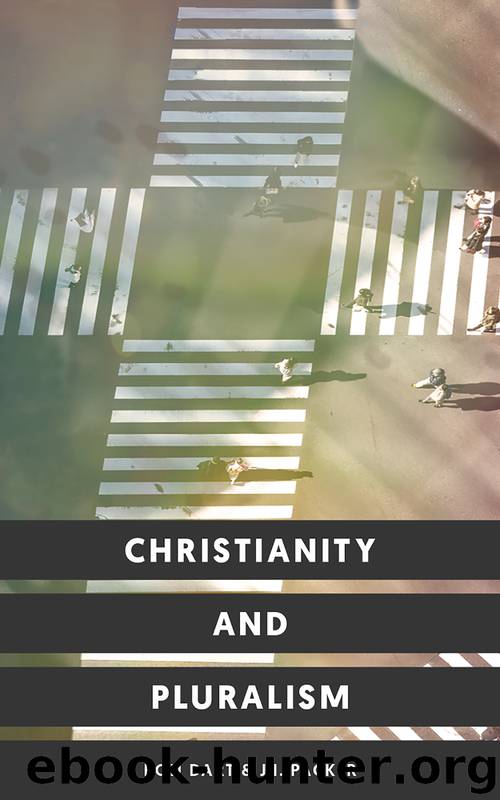Christianity and Pluralism by Dart Ron & Packer J. I

Author:Dart, Ron & Packer, J. I.
Language: eng
Format: epub
Tags: Cultural pluralism--Religious aspects--Christianity.
Publisher: Bellingham, WA
Published: 2019-03-11T16:00:00+00:00
OUR GLOBAL VILLAGE, PLURALISM, AND INTER-FAITH DIALOGUE
The Lambeth Conference (1988) published a timely pamphlet on this challenging subject entitled Towards a Theology for Inter-Faith Dialogue. True to the tradition of not unduly offending anyone, it speaks in the language of “towards,” “dialogue,” “exploration,” “beginnings,” “journey,” “pilgrimage,” and “provisional thinking” on this controversial topic. We must never denigrate the tentative and suggestive nature of such large and complex issues, but such an approach to inter-faith dialogue can too easily get mired in process and procedure and become, tragically, soft on substantive content. The reaction to this more hesitant liberal approach, with its proper respect for uncertainty, the “God beyond God” and the “Divine Mystery,” is often a pinched and narrow fundamentalism in which all theology must be about clear, distinct, and absolute views of God and many other things. Liberals and fundamentalists, often, spend much of their waking hours reacting to one another. The position taken by the Lambeth Conference walks the extra mile to acknowledge the valid insights of other faith traditions (and rightly so), but it runs the risk, in doing so, of leveling the religious playing field. The fact that we live in an “inter-spiritual age” cannot be denied, but are all forms of spiritual theology equally valid? Towards a Theology for Inter-Faith Dialogue raises many key questions, but the hesitancy of the pamphlet tends to be both its strength and weakness.
We live at a period of time when mysticism, spirituality, myth, narrative, symbol, and the esoteric have been given preferred status to theology and the institutions of the major and minor religions of the world. This is a cultural reaction, of course, to the way theology has been taken captive by Cartesian rationalism and the means by which religious institutions have often betrayed their high calling. But, as a reaction, it has a limited life expectancy. Those who assume that they can falsely and artificially sever spirituality and theology fail to see that as soon as they open their mouths they are doing theology. We are in a desperate need for a solid mystical theology rather than a reactive pluralist pietism that uncritically assumes an “ersatz” and uprooted interest in some sort of vague “spirituality” will answer the deepest longings of the human heart, head, and culture.
The recent publication of Bishop Michael Ingham’s Mansions of the Spirit, yet once again, opens up for us important issues that must be addressed. We must not flinch from entering and being challenged by our multi-faith context; there is much to be learned from the wisdom of other religious traditions. Mansions of the Spirit is a rather popular apologetic for “the Primordial tradition” and the inter-faith movement that began with the first Parliament of World’s Religions in 1893 and culminated in a second Parliament in 1993. Ingham probes four models for inter-faith dialogue in Mansions of the Spirit: exclusive, inclusive, pluralist, syncretist. The conclusion of the book tends to waffle between a sort of critical pluralism and transcendent syncretism, and it is difficult to sort out where Ingham finally plants his flag.
Download
This site does not store any files on its server. We only index and link to content provided by other sites. Please contact the content providers to delete copyright contents if any and email us, we'll remove relevant links or contents immediately.
Under the Banner of Heaven: A Story of Violent Faith by Jon Krakauer(1788)
The Early Centuries - Byzantium 01 by John Julius Norwich(1736)
The Amish by Steven M. Nolt(1562)
Taken by J. C. Owens(1556)
In Spirit and Truth (In Spiritu Et Veritate Series) by Reed Zoe(1543)
Play It as It Lays by Joan Didion(1502)
The Apogee - Byzantium 02 by John Julius Norwich(1442)
The Last Man in Russia by Oliver Bullough(1392)
David Sedaris Diaries by David Sedaris(1288)
A History of the Amish by Steven M. Nolt(1286)
The Dance of Change by unknow(1250)
Leaving the Witness by Amber Scorah(1247)
Fallen by unknow(1208)
Tears of the Silenced: A True Crime and an American Tragedy; Severe Child Abuse and Leaving the Amish by Misty Griffin(1191)
The Angel of Forest Hill by Cindy Woodsmall(1143)
Deep Blue by unknow(1140)
The Best of Amish Cooking by Phyllis Pellman Good(1139)
The Ariana Trilogy by Rachel Ann Nunes(1122)
Escape by Carolyn Jessop & Laura Palmer(1116)
